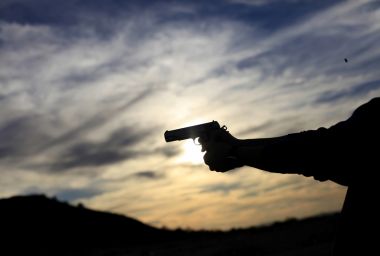Armed guards at US churches: Why it's tempting, and why it's wrong

There's been a lot of soul-searching in America after the Charleston massacre in which a white supremacist killed nine people gathered for a prayer meeting. A lot of it's been about racism, the Confederate flag and the American obsession with guns.
But along with that, it's made some churches ask hard questions about security and just how ready they'd be if their congregation was the next target. Rev Chris Hill, pastor of The Potter's Church in Denver, recently gave an interview explaining why his 7,000-member church needs a team of security guards, some of them armed. "We've never been safe in our churches – not an African-American man, not in America," he said. "You come to church and you just suspend that feeling of vigilance, and we now live in an America where you must be vigilant."
Now a pastor in Shelby, North Carolina, has announced that he's taking his church down the same route. Rev Melvin Clark of the town's Missionary Baptist Church says his church is seeking 10 members to act as armed guards during services. Pending the approval of funding by the church board, it will buy them guns and it will train them. Clark said: "We don't need to go overboard, we just need to be equipped," adding: "I would not want anybody to get injured or killed on my watch."
As hard questions go, they don't come much harder than this. No one – particularly on the wrong side of the Atlantic – could condemn black congregations for feeling unsafe after Charleston, or black communities in general feeling unsafe after Ferguson.
But buying guns for armed guards? There's something in most Christians that recoils at the idea. We are servants of the Prince of Peace. We struggle with the idea of violence at all, regarding it as at best a necessary evil. Importing the tools of death into a place where the gospel of abundant life is preached seems profoundly wrong.
And yet, and yet.
In the video feature about The Potter's Church, it was clear that the security team were professionals whose very last impulse would be to shoot someone. They were not Special Forces rejects hovering around potential undesirables with their fingers on hair triggers.
Congregations attracting hundreds or even thousands of people have to take a different approach to security. They can act as magnets to evildoers. The more people who attend, the harder it is to be sure that they're all legit.
If someone at Charleston had been armed, maybe some of those who died would still be alive. That's what's in Pastor Clark's mind: it's his watch, and he feels responsible.
Anyone in their right mind knows that America has too many guns. But America has too many guns. They're out there, and it's too late to call them back. Anyone who wants one can get it and use it to kill someone because they don't like the colour of their skin, or their religion, or their politics. If the bad guys have guns, the good guys need them too.
Ignoring the real strength of these arguments doesn't do anyone any favours.
But here's my problem.
There are tens of thousands of churches in America, with millions of adherents. The number that have actually been attacked is, in proportion, vanishingly small. Each death, each injury is a tragedy, but to make them the basis for a policy that's so intuitively counter to Christian values is a long step into a dark place.
Guns don't solve problems, they create problems. For every life saved, hundreds are lost. Guns in the home increase the risk of homicide, suicide and accidental death. If church services are routinely patrolled by armed guards, that just means more guns in circulation in a country that already has as many guns as it has people. And even if a gun is used to stop someone who's intent on killing, there's no guarantee that it will hit the right target – there's every chance of an accidental wounding or killing.
There are security precautions that churches can take short of arming themselves. They can liaise with local police departments. They can have non-lethal measures available. They can develop a culture of vigilance.
And yes, the chances are that there will be another Charleston, and that someone will say, "If only we'd had guns this wouldn't have happened."
Maybe – and maybe not. But one thing that's sure is that when churches go armed, it normalises and sanctifies violence. American congregations should be very, very worried about that.
Follow @RevMarkWoods on Twitter.











